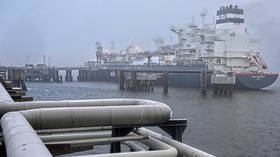Biden halts new LNG exports to Europe

US President Joe Biden has ordered a pause on liquefied natural gas (LNG) exports from new projects in the country, citing their potential contribution to climate change. Energy costs in Western Europe have skyrocketed since nations such as Germany switched from Russian gas to American LNG, but Biden insists the continent doesn’t currently need additional supplies.
The pause will allow the US Department of Energy (DOE) to update the economic and environmental guidelines it uses when approving new export licenses, and will last for several months.
“During this period, we will take a hard look at the impacts of LNG exports on energy costs, America’s energy security, and our environment,” Biden said in a statement on Friday. The president added that the pause “sees the climate crisis for what it is: the existential threat of our time.”
According to the White House, roughly half of American LNG exports went to Western Europe last year, and the US has exceeded its annual delivery targets to the EU for each of the last two years. “Today’s announcement will not impact our ability to continue supplying LNG to our allies in the near-term,” Biden claimed in his statement.
Europe remains mired in an energy crisis. The continent’s former industrial powerhouse, Germany, is “in a particularly difficult situation” after abandoning Russian gas supplies, Economy Minister Robert Habeck told lawmakers last week. Prior to the imposition of sanctions on Moscow over the Ukraine conflict, Germany received 40% of its gas imports from Russia. Replacing this fuel with LNG from the US, as well as energy from Norway and the Netherlands, has come at a cost, with the German government forced to roll out massive subsidy packages to prevent its largest industrial firms from leaving the country.
German industrial output fell by 2% last year, while the entire economy shrank by 0.3% in the same time period, the country’s Federal Statistical Office reported last week. The office blamed the decline on high inflation, soaring energy prices, and weak foreign demand.
LNG is transported on large tanker ships to regasification plants, where it is heated to return it to a gaseous state. Germany has rushed to bring three such offshore plants online since early 2022, and plans to open three more over the coming months. The US has also built out its LNG export infrastructure to cope with the demand, including the Calcasieu Pass 2 project in Louisiana, which once certified will be the nation’s largest export terminal.
The Calcasieu Pass 2 facility will likely come before the DOE for approval in the coming weeks, where it will be stalled indefinitely by Biden’s pause. With half of the terminal’s output set to go to Germany, a spokesman for the project’s developer, Venture Global, told Reuters last week that the pause would send a “devastating signal to our allies that they can no longer rely on the United States.”













